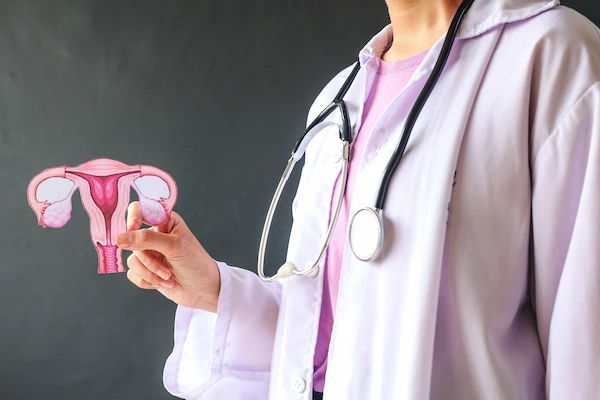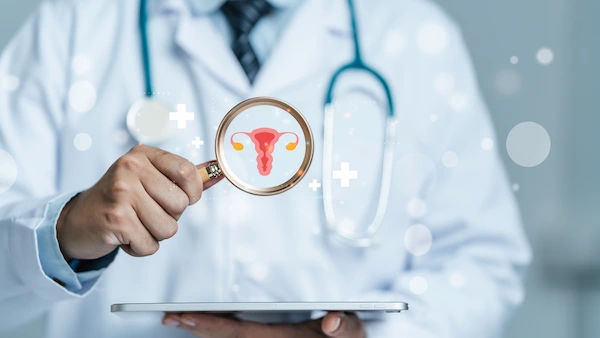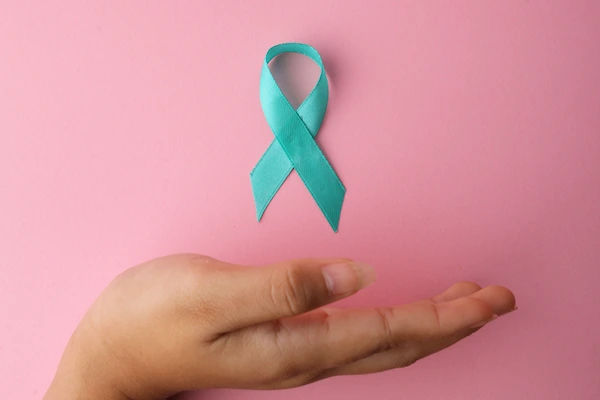Cervical Cancer: Prevention and the HPV Vaccine
Learn how to prevent cervical cancer with the HPV vaccine, regular screenings, and healthy lifestyle choices for long-term protection.

.webp?tr=q-80,f-webp,w-350,dpr-2,c-at_max 700w)
Introduction
Cervical cancer was once a leading cause of cancer death among women worldwide. But today, we have a powerful advantage: cervical cancer is one of the most preventable and treatable forms of cancer when detected early. The key lies in understanding the tools at our disposal. This guide demystifies cervical cancer, focusing squarely on prevention. We will explore the vital roles of the HPV vaccine and regular screening, breaking down the science into actionable steps you can take for your long-term health. Whether you're a parent considering vaccination for your child or an individual seeking to stay proactive about your gynaecological health, this article will equip you with the knowledge to significantly reduce your risk. By embracing modern medical advancements, we can all move towards a future free from this disease.
Understanding Cervical Cancer: The Basics
Before diving into prevention, it's helpful to understand what we're preventing. Knowledge is the first step towards empowerment.
What is the Cervix and What is Cervical Cancer?
The cervix is the lower, narrow end of the uterus that connects to the vagina. Cervical cancer occurs when the cells lining the cervix begin to grow uncontrollably. Importantly, this process doesn't happen overnight. It usually develops slowly over many years, beginning as a condition called dysplasia, where precancerous cells appear. This long pre-cancerous stage is what makes screening so effective, as it allows for early detection and treatment before cancer fully develops.
The Primary Cause: The Link Between HPV and Cervical Cancer
Over 99% of cervical cancer cases are linked to long-term infection with certain types of Human Papillomavirus (HPV). HPV is an extremely common virus spread through intimate skin-to-skin contact; nearly all sexually active people will get it at some point in their lives. For most, the immune system clears the virus naturally. However, when high-risk types of HPV (especially types 16 and 18) persist in the body, they can cause changes in cervical cells that may lead to cancer. This direct causal relationship is the reason why targeting HPV is the cornerstone of cervical cancer prevention.
Consult a Gynaecologic Oncologist for the best advice
The Two Powerful Pillars of Cervical Cancer Prevention
The strategy to defeat cervical cancer rests on two proven pillars: vaccination to stop the virus before it starts, and screening to catch any abnormal changes early.
Pillar 1: HPV Vaccination (Primary Prevention)
The HPV vaccine is a revolutionary tool in the fight against cervical cancer. It works by preparing your immune system to recognise and fight off the HPV virus before it can cause an infection. It is a preventive, not a therapeutic, vaccine, meaning it is most effective when administered before a person is exposed to the virus.
Who Should Get the HPV Vaccine?
The CDC and WHO recommend routine vaccination for:
- Adolescents: Both boys and girls aged 11-12 years, though it can be started as early as age 9.
- Catch-up Vaccination: Everyone through age 26 who was not adequately vaccinated earlier.
- Adults 27-45: The vaccine is now approved for this age group. While less effective due to likely prior exposure to HPV, it can still be beneficial. A discussion with your doctor is recommended to decide if it's right for you.
Available HPV Vaccines and Their Schedule
The most common vaccine available globally is Gardasil 9, which protects against nine types of HPV (including the high-risk 16 and 18). The schedule typically involves two doses for those starting before age 15, spaced 6-12 months apart. For those starting after 15, three doses are recommended over a six-month period.
Addressing Common Concerns About the HPV Vaccine
The HPV vaccine has been extensively studied and is proven to be safe and effective. Common side effects are mild and temporary, like pain at the injection site, fever, or dizziness. It does not cause fertility issues; in fact, by preventing cervical cancer, it protects fertility. If you have specific concerns about the side effects of the cervical cancer vaccine, the best step is to have an open conversation with a healthcare professional.
Pillar 2: Regular Screening (Secondary Prevention)
Even if vaccinated, regular screening remains crucial because the vaccine does not protect against all cancer-causing HPV types. Screening tests can detect precancerous changes early when they are easiest to treat.
The Pap Test (Pap Smear): What to Expect
A Pap test (or Pap smear) is a simple procedure where a doctor collects cells from your cervix to be examined under a microscope for abnormalities. It is a quick, in-office procedure that is generally painless. Guidelines recommend starting Pap tests at age 21 and repeating them every three years if results are normal.
The HPV Test: A More Direct Approach
The HPV test checks directly for the presence of high-risk HPV strains in cervical cells. It is often used for women over 30, either alone (primary HPV testing) every 5 years or in conjunction with a Pap test (co-testing) every 5 years.
Understanding Your Screening Results and Next Steps
An abnormal result does not mean you have cancer. It often indicates the presence of HPV or minor cell changes. Follow-up steps may include a repeat test in a year or a colposcopy, a procedure to examine the cervix more closely. If precancerous cells are found, minor treatments can remove them, effectively preventing cancer from developing. If your screening results are abnormal, consulting a gynaecologist is essential for a clear diagnosis and management plan. You can consult a doctor online with Apollo24|7 for an initial discussion of your results.
Beyond Vaccination and Screening: Additional Risk Reduction Strategies
While vaccination and screening are the most critical steps, other lifestyle factors can influence your risk.
The Role of Safe Sexual Practices
Using condoms consistently and correctly can reduce, though not eliminate, the risk of HPV transmission. Limiting your number of sexual partners also lowers the likelihood of exposure to high-risk HPV types.
The Impact of Smoking Cessation
Smoking is a significant co-factor for cervical cancer. Toxins from tobacco smoke damage the DNA of cervical cells and weaken the immune system, making it harder for the body to clear an HPV infection. Quitting smoking is a powerful step toward reducing your risk.
Supporting Your Immune System
A healthy immune system is your body's best defence against persistent HPV infection. Maintaining a balanced diet rich in fruits and vegetables, getting regular exercise, managing stress, and ensuring adequate sleep all contribute to robust immune function.
Recognising the Signs: Symptoms of Cervical Cancer
Early-stage cervical cancer often has no symptoms. This is why regular screening is non-negotiable. Symptoms usually appear when the cancer has grown and invaded nearby tissue. Be aware of:
- Unusual vaginal bleeding (after intercourse, between periods, or after menopause)
- Persistent, watery, or foul-smelling vaginal discharge
- Pelvic pain or pain during intercourse
If you experience any of these symptoms persistently, it is important to see a doctor for evaluation. While they can be caused by other conditions, it's crucial to rule out cervical cancer.
Conclusion
The journey to eliminating cervical cancer is within our grasp. It is a path paved with awareness, proactive healthcare, and the powerful tools of vaccination and screening. By understanding that this cancer is caused by a common virus and that we have the means to block that virus and intercept its effects early, fear can be replaced with confidence. Take charge of your health by staying informed, adhering to screening guidelines, and ensuring the younger generation is protected through vaccination. Remember, consistent action is the key. Speak with your healthcare provider today to ensure you are up to date on all recommended preventive measures. Your future self will thank you for the peace of mind and the gift of health.
Consult a Gynaecologic Oncologist for the best advice
Consult a Gynaecologic Oncologist for the best advice

Dr. Sreeparna Roy
Obstetrician and Gynaecologist
8 Years • MBBS , MS (OBSTETRICS & GYNAECOLOGY), Fellowship in Infertility, Endoscopy & Ultrasonography), Fellowship in Laparoscopy & Hysteroscopy,DRM
Kolkata
Dr Utsa Basu Clinic, Kolkata

Dr. Sai Lakshmi Daayana
Gynaecological Oncologist
18 Years • MBBS, MRCOG
Hyderabad
Apollo Hospitals Jubilee Hills, Hyderabad
(225+ Patients)

Dr. Revathi S Rajan
Obstetrician and Gynaecologist
24 Years • MBBS, DGO, DNB.FFMM
Bengaluru
Apollo Clinic, JP nagar, Bengaluru
Dr. Navin Srinivasan
Gynaecological Oncologist
9 Years • MBBS, MS DNB(OBS-GYNAE), MCH (GYNAE ONCOLOGY)
Bengaluru
Apollo Clinic Mahadevapura, Bengaluru

Dr. Swati Shah
Surgical Oncologist
15 Years • DNB Surgical Oncology, certified Robotic Cancer Surgeon
Ahmedabad
Apollo Hospitals Gandhinagar, Ahmedabad
(25+ Patients)
Consult a Gynaecologic Oncologist for the best advice

Dr. Sreeparna Roy
Obstetrician and Gynaecologist
8 Years • MBBS , MS (OBSTETRICS & GYNAECOLOGY), Fellowship in Infertility, Endoscopy & Ultrasonography), Fellowship in Laparoscopy & Hysteroscopy,DRM
Kolkata
Dr Utsa Basu Clinic, Kolkata

Dr. Sai Lakshmi Daayana
Gynaecological Oncologist
18 Years • MBBS, MRCOG
Hyderabad
Apollo Hospitals Jubilee Hills, Hyderabad
(225+ Patients)

Dr. Revathi S Rajan
Obstetrician and Gynaecologist
24 Years • MBBS, DGO, DNB.FFMM
Bengaluru
Apollo Clinic, JP nagar, Bengaluru
Dr. Navin Srinivasan
Gynaecological Oncologist
9 Years • MBBS, MS DNB(OBS-GYNAE), MCH (GYNAE ONCOLOGY)
Bengaluru
Apollo Clinic Mahadevapura, Bengaluru

Dr. Swati Shah
Surgical Oncologist
15 Years • DNB Surgical Oncology, certified Robotic Cancer Surgeon
Ahmedabad
Apollo Hospitals Gandhinagar, Ahmedabad
(25+ Patients)
More articles from Cervical Cancer
Frequently Asked Questions
Can I get the HPV vaccine if I am over 26?
Yes, the HPV vaccine is approved for adults up to age 45. While it's most effective before sexual debut, it can still offer protection against HPV strains you haven't been exposed to. Discuss the potential benefits with your doctor to see if it's right for you.
If I have HPV, does it mean I will get cervical cancer?
No, not necessarily. Most HPV infections clear on their own within two years without causing any problems. The concern is with persistent infections from high-risk HPV types. This is why regular monitoring through HPV tests is so important.
How often should I get a Pap test after age 30?
Guidelines vary, but a common recommendation is to have a Pap test every three years or a co-test (Pap and HPV) every five years. Your doctor can provide the best schedule based on your personal health history.
Are there any natural ways to clear an HPV infection?
There is no proven natural cure for HPV. However, supporting your immune system through a healthy lifestyle, good nutrition, not smoking, and adequate sleep can help your body fight the virus effectively, increasing the chances of clearance.
Is cervical cancer hereditary?
Cervical cancer itself is not generally considered hereditary. The primary risk factor is persistent HPV infection. However, there may be genetic factors that influence how your immune system responds to HPV.
.webp)



